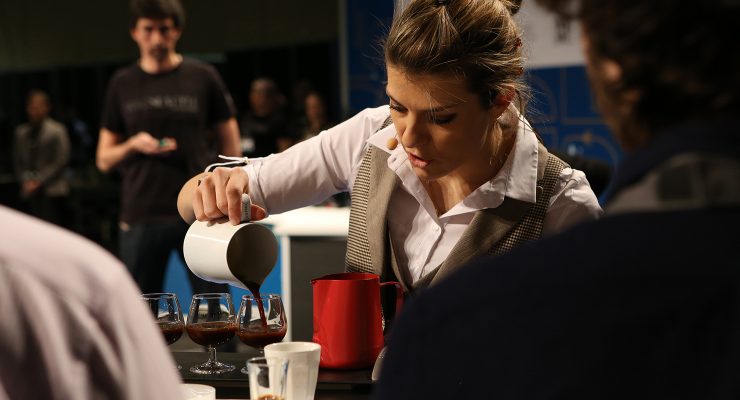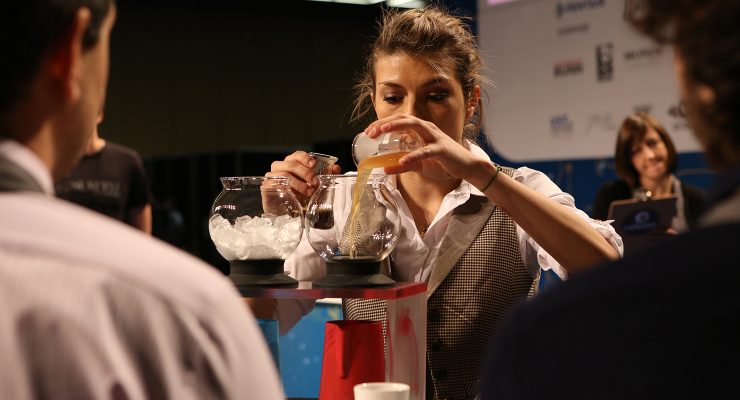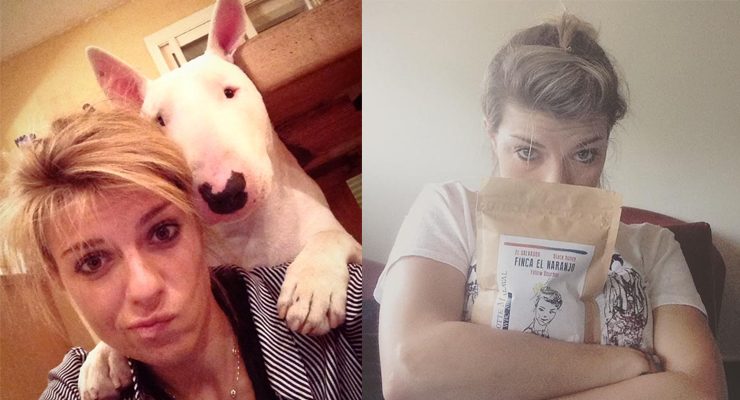During a pause in competitors on finals Sunday at the 2015 World Barista Championship (WBC), emcees roved the audience for quick interviews to fill the time. After a bit of banter, one interviewee remarked on the “one-person symphony” of barista competition routines, in reference to the balance routines strike in sharing both ideas and beverages, all set to music and exacting in their timing.
This apt metaphor came after the performance of Charlotte Malaval, 2015 Barista Champion of France, and the first French barista in history to compete in the WBC finals round. While barista competitions can be a crucible for a coffee lover’s emotions (either down in the arena or up in the stands), Malaval burst onto the world stage unfazed—relaxed, yet ready. Her one-person symphony was fifteen minutes of accordion music, cheerful knowledge bombs, heat, ice, and the presentation cadence of a seasoned competitor.
Malaval, who placed sixth in the 2015 WBC in Seattle, is a cultural anthropology student turned coffee professional; she left the University of Provence to take coffee classes and pursue working in coffee full-time. A self-described “Freelance Barista,” Malaval travels around the world participating in workshops and exhibitions, and is involved with education and certification with the Specialty Coffee Association of Europe. I had the opportunity to get to know her a bit better, in the discussion below.
Sprudge: Can you tell us a bit about your journey in becoming a coffee professional?
Charlotte Malaval: It started out with my first cup of specialty coffee, I tasted it and it was such a shock. I had the opportunity to meet people who explained what contributed to the flavor, then I took my first barista class, completely out of curiosity to see how it was all done. After that, I followed my intuition and decided to stop University and start working in coffee, or rather, start learning in coffee. I still feel like a student, just a student in coffee.
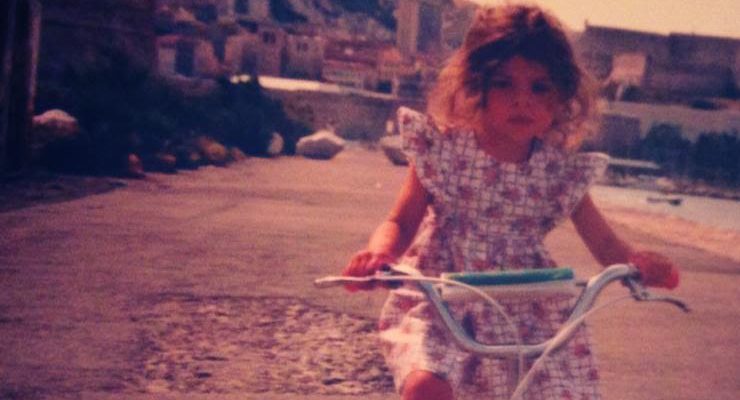
Anthropology (my major) and coffee are not such different fields… Anthropology is about studying different world cultures from different points of view… and coffee is completely a cultural product; its production and consumption totally depend on what part of the world you’re in. The reasons behind the differences can be found in the respective culture of each place, in its structures, process, habits, organizations, beliefs, mythology—and none of these ever stay the same.
You have a good relationship with Francesco Sanapo, who was one of your mentors for WBC 2015, yes? Tell us about the relationship there, and what it was like preparing for a world stage.
I met Francesco last year during an exhibition in Belgium. He came to me and asked me if I was competing again this year (I placed third that year in France’s barista championship).
Initially, I told him that I wanted to wait one year to compete again, to have more time to prepare something serious, and have more experience (at this point, there was only a month before the 2015 national cycle). So he offered to coach and prepare me this year, because he thought it was unfortunate to lose one year of competition experience at my age.
After I won the national championship, we started preparing for the WBC where Michael McCauley (Cafés Richard) joined the team and invested so much of himself. He helped us a lot with his international judging experience. I improved so much.
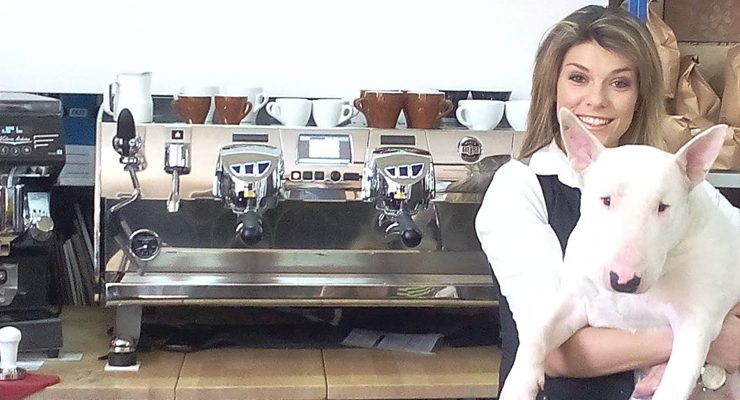
Photo courtesy Charlotte Malaval.
I’m so grateful for all the amazing moments I shared with them and the opportunities to learn and fully live this unique experience. It really was like preparing for two different competitions in two months, though, because the competition at the WBC was on a completely different scale from the one we did in France. The experience was so intense, from the first day of training, thinking about the coffee and the concept, to the presentation in front of the judges at the WBC in Seattle.
What made the WBC so much different than the national competition? In what way was it harder? In what way did you prefer the world stage?
France’s national competition is run really well. I was lucky to have been judged by some of the best international judges, and work on the same machine we used at WBC. I felt prepared to compete on the world stage. Of course, it was great to meet the best baristas from all over the planet, and share coffees, stories, and passions. Total barista’s paradise. We need World Coffee Events all year long!
Your presentation at WBC was about temperature, but what other concepts and ideas excite you about coffee?
In coffee, as I mentioned in my performance, if you’re changing only one parameter in the whole process, it could completely change the final result. I chose temperature as a theme because we can find this as a parameter during the whole seed to cup story (climate, dryer temperature, roasting temperature). Besides that, there are so many other aspects of coffee which fascinate me! (Origin, variety, altitude, soil, process, roasting.) What excites me the most, as I mentioned before, is the immense diversity of the coffee world, the limitless potential for exploration, both in terms of knowledge of the coffee itself and the cultural diversity that results from it.
You’re the first woman to reach the finals stage at the WBC since Mikki Suzuki in 2012. Any thoughts on gender in coffee?
First of all, this is a coffee competition—whether you’re male or female, that’s not the essential thing! Even if there is a dominance of men (as in many crafts), I have never had a problem with this. I have always felt very well supported. However, I did consider that there were too few women baristas in the competition in Seattle. If my presence in the finals can give others confidence to participate, I would feel honored. One day, there will certainly be a female world champion!
What’s next for you in coffee? Will you compete in the next competition cycle?
Absolutely! Barista competitions have made my passion for coffee explode. It has helped me learn faster, develop as a professional, and even helps with the training and education part of my job.
Dawn Shanks (@DawnShanks) is an American coffee professional based in Washington DC. Read more Dawn Shanks on Sprudge.
The post This Freelance Barista From France Is One Of The World’s Best appeared first on Sprudge.


